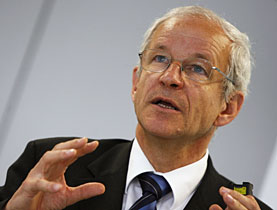Outside funds raise bar at top university

High-flying students will be awarded grants covering their cost of living as Zurich's Federal Institute of Technology seeks to attract the best international talent.
The initiative will be funded by private donations, which are playing an increasingly important role in plans to compete with the world’s premier seats of learning.
The Institute is currently piloting the Excellence and Opportunities Scholarships with 13 top grade students receiving SFr21,000 ($20,200) in 2007 and 20 more being awarded the grant this year.
Funds have now been allocated for more than double this number of Masters students in future years.
This is in contrast to a controversial proposal last week by the Swiss Business Federation, economiesuisse, to saddle underachieving students with higher fees and allow the best academic performers to study for free.
The scholarships – along with plans to introduce 80 new professors in the next ten years and the construction of 1,000 affordable housing units at the Science City research complex – are part of an expansion drive at the Institute.
“We must grow to keep up with international competition,” President Ralph Eichler said at the annual conference in Zurich on Monday.
State funding still makes up the lion’s share of the total budget, but a minimal increase last year has forced the Institute to look elsewhere for money to implement its plans. Last year, funding from external sources accounted for nearly 17 per cent of the budget, compared with 12 per cent in 2001.
Tapping into industry
Donations from companies, individuals and other bodies to the Institute’s fundraising Foundation rose from SFr20 million in 2006 to SFr35 million last year.
“It’s the way the top American universities have been working for a long time and this has spilled over into Europe. To stay competitive it is important that we attract research money and private donations to this school,” Eichler told swissinfo.
“Industry have got rid of their big research labs and they are now looking to the top universities. We really want to play in this league and work with global companies.”
Formed in 2003, the Foundation plans to raise enough money to provide a steady stream of income through interest payments. But Eichler admitted that the project is still in its infancy.
“At [United States college] Yale, alumni gave $400 million last year and we are a long way from that. It is one of our goals to build up a relationship with the alumni of this school,” he told swissinfo.
“Since this is not a tradition we have to learn how to do it. Yale has 100 people in its fundraising department and we have four.”
Spin-offs
The Institute boasted a record 21 spin-off companies last year, the conference heard – 69 in the past five years and a total of 176 since the programme started 14 years ago.
The majority of these companies are in the information technology and communications field, but other sectors include medicine, nanotechnology, materials science, biotechnology and the service industry.
Of greater significance is the fact that 80 per cent of the companies survive their first five years, compared with just under half of new firms throughout Switzerland and a mere fifth of research spin-offs in the United States.
swissinfo, Matthew Allen in Zurich
Founded in 1855, Zurich’s Federal Institute of Technology is part of a wider group of science and technology teaching and research establishments.
These include the Federal Institute of Lausanne, the Paul Scherrer Institute, the Swiss Federal Institute for Forest, Snow and Landscape Research, the Materials Science and Technology Research Institute and the Swiss Federal Institute of Aquatic Science and Technology.
In 2007, the Zurich Institute had 14,000 students (up 500 from 2006) and 368 professors from 16 departments. A total of 21 Nobel Laureates are associated with the Institute.
It offers 23 bachelor programmes and 34 Masters courses and has 2,900 doctoral students.
Some SFr215 million was raised from external sources last year, making up nearly 18% of the total SFr1.2 billion budget. Federal funding accounted for the rest of the budget.

In compliance with the JTI standards
More: SWI swissinfo.ch certified by the Journalism Trust Initiative



You can find an overview of ongoing debates with our journalists here. Please join us!
If you want to start a conversation about a topic raised in this article or want to report factual errors, email us at english@swissinfo.ch.